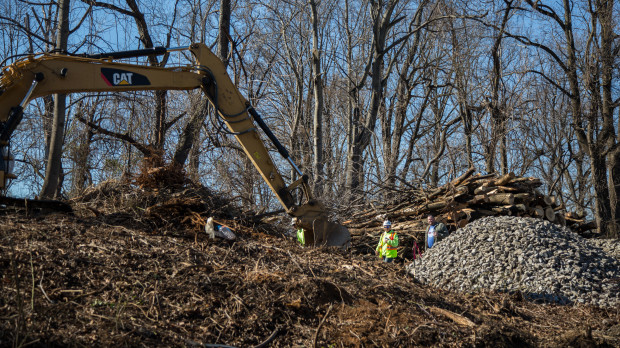Delco zoning board refuses to block Mariner East 2 pipeline

Emily Cohen / StateImpact PA
Construction on the Mariner East 2 pipeline has already begun in Delaware County. Thornbury Township resident failed to convince the zoning board to block it.
The latest local effort to block the Mariner East 2 pipeline failed late Monday when a zoning panel in Delaware County denied an appeal against three permits that have allowed its construction.
Thornbury Township’s Zoning Hearing Board turned down a request by a local homeowners association to withdraw the permits to install a fence, a utility pole and automated pipeline equipment. The residents’ group argued that the items would violate a local ordinance that requires at least 40 percent of land in their tract to remain as open space.
But the panel said in a statement after a three-hour meeting that it had seen “insufficient proof” that the construction activities by Sunoco Logistics would violate the ordinance, and denied the appeal. Rich Raiders, an attorney for the Andover Homeowners Association, said he would talk with his client about whether to appeal the decision to the Delaware County Court of Common Pleas.
The appeal was the first such action to come before the board for at least 12 years, said Township manager Jeffrey Seagraves, who added that appeals are commonly filed against the non-issuance of permits but not their issuance.
The unusual nature of the action may reflect the strength of local concerns about the safety of the pipeline, which is due to carry highly pressurized natural gas liquids through densely populated areas like Delaware County, starting in the third quarter. The approximately 50 residents attending the standing-room-only meeting in a township building were also drawn by their anger against the zoning board officials who, the residents said, have paid little attention to their concerns.
“These are our homes, this is where we have invested our money, this is where our kids play,” resident Jennifer Berlinger told the four-person board during an impromptu public-comment section. “You seem to be laughing at us. I would just appreciate some respect.”
Recent local actions in Delaware County and beyond have included legal moves designed to force townships to enforce ordinances that would prevent the pipeline being built in certain locations; meetings by school officials seeking assurances that the pipeline won’t threaten student safety, and right-to-know requests filed by individuals seeking information about the project from local officials.
Earlier Monday, the Pennsylvania Office of Open Records handed Aston Township resident Melissa Haines a minor victory when it directed the township to meet her request for withheld information on the pipeline.
The office said the township, also in Delaware County, had not met its responsibilities under the state’s Right to Know Law, and it directed local officials to provide Haines with the requested information within 30 days.
Sunoco has alienated some opponents by taking their land in eminent domain actions, and renewed worries about its safety record on April 20 when it disclosed that the existing Mariner East 1 pipeline, which runs along the same route as the new line, had leaked about 20 barrels of natural gas liquids near Morgantown, Berks County, on April 1, before being shut off.

Jon Hurdle / StateImpact PA
Thornbury township residents who oppose the Mariner East 2 pipeline failed to get the zoning board to block it.
Last week, the company completed a merger with Energy Transfer Partners, operator of the Dakota Access Pipeline which earlier this year fought and beat the Standing Rock Sioux Tribe over the right to build that pipeline across tribal land in North Dakota. Sunoco Logistics has taken the name of Energy Transfer Partners.
The company insists that the $2.5 billion, 350-mile Mariner East 2 pipeline from southwest Pennsylvania to a terminal at Marcus Hook near Philadelphia will be safe, is subject to automatic shutoffs in the case of any leak, and meets or exceeds federal safety standards.
Anthony Gallia, an attorney for Sunoco, said on Monday evening that the company had a right to build where it did, and that township officials knew the details of its plans when they issued permits.
“There is no obligation there on Sunoco to prove that they had the right to build,” Gallia said, urging the zoning board to deny the appeal. “The township supervisors certainly knew what the work was and where it was going.”
Raiders argued that in issuing the permits, township officials had not taken into account the presence in local soil of arsenic, which was once used as a pesticide in an orchard, and later remediated to make way for a housing development. Although the cleanup met federal requirements, soil disturbance from the pipeline construction could once again expose residents to harmful levels of the contaminant, he said.
Raiders, who also represents Huntingdon County’s Gerhart family which is fighting Sunoco on another section of the line, said he was not surprised by Monday night’s ruling. “It’s a very uphill battle when you’re representing land owners,” he said. “The rules are very much set up in favor of the companies in these situations. I don’t think the board understood the questions regarding the environmental hazards of this work, and I think this was beyond what most governmental agencies are used to dealing with.”
Beth Alois, an 11-year resident of the township, said after the meeting that the denial was expected but the appeal had shown the strength of local feeling on the pipeline issue.
“They took an important step forward by being so visible and vocal about their concerns about how Sunoco has been treating them and their property,” Alois said. “Despite the loss, they made their voices heard, and I think in the future, the township will interact with them in a more positive way.”
















